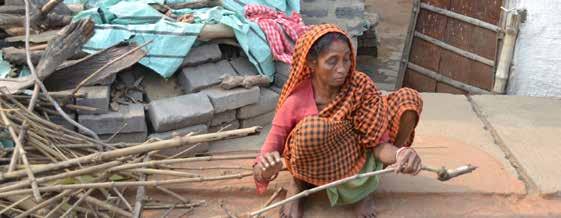
3 minute read
The Changing Church Landscape
from USPG Koinonia Issue 4 1/2021
by USPG
ISSUE 4 1/2021
By Karen Smriti Elias, Diocese of Durgapur
A woman forages for sticks to cook meals
India’s response to Covid-19 came in March with the announcement of a nationwide lockdown. This was devastating for dailywage labourers who number in the millions and migrate to larger towns and cities for work. It also led to the deterioration of the economy which resulted in massive job losses for thousands of people. The abrupt announcement of the lockdown also meant the public were not prepared and those living in poverty and the indigent were most severely affected. Thousands were starving. The Diocese heard accounts of suffering, of missing and lost people, child marriages, of adults and children being trafficked. The confusion and a lack of planning, led to many taking advantage of the chaos, leading the vulnerable astray. A few weeks into the lockdown, the government reached out to civil bodies throughout the country to help those in dire circumstances. The churches were among the thousands who came forward. Many dioceses have been active with relief campaigns to help those who have not rupee to their name or a grain of rice to eat. We focus on the distribution of food, clothes and other necessities. The Synod and its dioceses all have their own programmes which focus on issues such as human trafficking, livelihood support and women’s empowerment. Being a minority body in a country as populous as ours can make such efforts seem like a bucket in an ocean. Usually the challenge for continuous effort is funding and a lack of sustainability. Before the pandemic, our charities and programmes on a church level, were usually focused on short-term relief. However, this didn’t and doesn’t stop us from providing some relief and hope to the impoverished and to help the oppressed. Our focus as a congregation is on God’s word and learning from Jesus’ life and then imitating it through our various projects and charities. Covid-19 offers churches the opportunity to convert from a worshipping community to a diaconal community; one which is committed to serving. It is giving us the opportunity to evolve into a missional church, which not only studies the Bible but reflects on the Holy Spirit which is in us and which can truly work through us. Times of suffering and adversity are often a turning point. The world is witnessing protests like the Anti-CAA* movement in India. This is a precursor for – hopefully positive – change. After witnessing extreme desperation and poverty, where the vulnerable knowingly leave themselves open to exploitation in the hope that they at least get one square meal a day, we as a Church can re-examine and restructure the way we do things. To bring about change, we must engage with the aim to educate and equip ourselves and the unempowered. There is no easy solution or quick answer. These are problems that our country was born with and ones which we are struggling to solve. Much of our relief work is thought of in terms of material goods but one option we could consider is to add focus on the emotional and mental components. To work on removing prejudice, empathise with the marginalised and powerless, and build awareness acknowledging their presence and problems would be a start of a long journey. This could lead to bigger change, not only in the lives of the people we wish to empower but also in the very nature of our Church. ■










